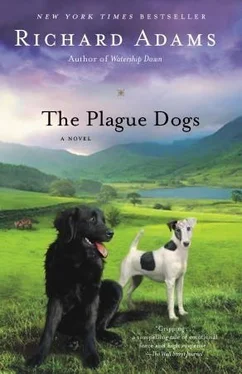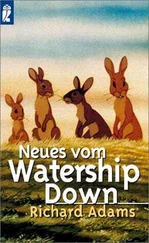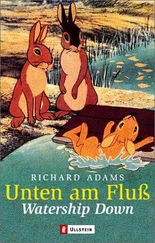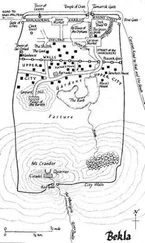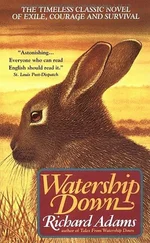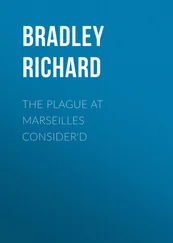Richard Adams
THE PLAGUE DOGS
To Elizabeth ,
with whom I first discovered the Lake District
QUEEN: I will try the forces
Of these thy compounds on such creatures as
We count not worth the hanging, but none human…
CORNELIUS: Your Highness
Shall from this practice but make hard your heart.
—Shakespeare,
Cymbeline
There is in this passage nothing that much requires a note, yet I cannot forbear to push it forward into observation. The thought would probably have been more amplified, had our author lived to be shocked with such experiments as have been published in later times, by a race of men that have practised tortures without pity, and related them without shame, and are yet suffered to erect their heads among human beings.
—Dr. Johnson
Lawson Park to Levers Hause
Levers Hause to Brown Haw
Wanderings in Dunnerdale
Across Country
On the Helvellyn Range
Return to Levers Hause
Levers Hause to Ulpha
Flight to the Sea
In 1715, when the Scotch Jacobites rose against the newly crowned English King George I, the citizens of Newcastle-upon-Tyne, near the English-Scotch border, shut the city’s gates against the southward-moving rebels, thus contributing to their defeat. The disgruntled rebels nicknamed them “Geordies” (the North Country pronunciation of “Georgie”) and this became the term for any inhabitant of Tyneside, or of Northumberland and Durham generally, as well as for the dialect spoken there.
Of all dialects spoken in the British Isles, Geordie, to a foreign visitor, is the hardest to understand. Listen to Tyneside workingmen talking among themselves and in all probability you’ll understand hardly a word. This is largely because, as recently as a thousand years ago, this area of England—the Scottish border—formed part of the Danish Viking realm. Many Geordie words (e.g., hyem, meaning home ) are Scandinavian, and several are entirely different from their English counterparts. (E.g., hoy = throw; clarts = mud, dirt; lum = chimney etc.) It is almost another language.
In this book the “tod” (fox), who is a wanderer, speaks Upper Tyneside, a rural form of Geordie, in contradistinction to the farmers and other inhabitants of Dunnerdale and Coniston in the Lake District (where the story takes place), who speak North Lancashire (an easier dialect to understand). In view of the formidable problems, for Americans, of understanding Geordie, even on the printed page, the tod’s speech has been a good deal simplified in this American edition. However, to alter it entirely would have been to take much of the salt out of the tod’s talk and character. Several Geordie words have therefore been retained. The following is a list of those not likely to be readily comprehensible to American readers.
• • •
Assa!: A common exclamation of emphasis, roughly equivalent to “Oh, boy!” or “I’m here to tell you!”
By : Another common exclamation of emphasis. E.g., “By, I’ll tell thee it were cold!” This is simply an oath with the oath left out, e.g., “By (God!),” much as Americans sometimes tone down “goddam” to, e.g., “golddurn.”
Canny : A much-used adjective, with many meanings. Clever, courageous (e.g., “canny lad”). Useful, welcome, helpful (e.g., “a canny drop of rain”). Careful (e.g., “Ca’ canny”—take care). Numerous (e.g., “a canny few sheep”), etc.
Clagged : Fastened.
Fash : Trouble, upset (verb), e.g., “Dinna fash yersel’”—don’t upset yourself.
Femmer : Faint-hearted, lacking in energy, courage, or drive.
Fyeul: Fool.
Haddaway !: Go away! Get away! Equivalent to “Get the hell out of it!” but also used figuratively, as equivalent to “What rubbish!” E.g., “Haddaway, ye fond fyeul!”
Hause : The neck or dip of lower-lying land between two peaks in a range; the “band” (as they sometimes call it) connecting one hilltop and the next.
Hemmel : Shed.
Hinny (also marrer) : Geordie contains several words meaning mate or friend , and these are used constantly in colloquial speech. In conversation, a Geordie continually addresses almost anyone (not only personal friends) as “lad,” “hinny,” or “marrer.” E.g., “Why ay, hinny” = “Yes, of course, my friend.” “What fettle the day, marrer?” = “How are you today, pal?” Interestingly, one of these many “pal” terms is “butty,” which crossed the Atlantic and has become the American “buddy.”
Hoo : How.
Howway! : A gentler form of Haddaway! Haddaway! is critical, even derisive. It means “You go away!” (not me). Howway , though it can certainly be used sharply, means no more than “Let’s go!” (i.e., you and I). Also a jovial greeting. When President Carter landed at Newcastle-upon-Tyne in May 1977, his first words to the waiting Geordie crowd were “Howway, tha lads!” (i.e., “How are you, lads?”). Naturally, they were delighted.
Hyem : Home.
Lonnin (really lonning , but in Geordie ultimate g’s are elided): An unmade lane leading from a farm to the nearest road. A lonnin may be anything from a few yards to half a mile long, or more.
Lugs : Ears. (As in “Wind? By, sennuf te blaa yer lugs off!”)
Marrer : See Hinny , above.
Mazer : One who amazes; a winner, a smasher. A common term of praise and commendation. E.g., “Yon Raquel Welch—by, mind, she’s weel-stacked, a reet mazer!”
Neet : Night.
Noo : Now.
Reet : Right.
W’ (sometimes wuh) : We.
Weel : Well.
Whin : Gorse. A large, gold-flowering bush, growing wild and often profusely on waste land. It is covered with very sharp thorns, and a thicket of gorse is virtually impenetrable to humans and to larger animals. A fugitive fox, dog, cat, etc., may well leave traces “clagged to the whin.”
Wor : Our.
Yaw : Ewe, a female sheep.
The entry to the Seathwaite coppermine shaft was blocked up some years ago, though the cavern at Brown Haw is still open. Otherwise the topography of the story is, to the best of my knowledge, correct.
The place-names are those in use by local people, and in the few cases where these differ from the names printed on maps, I have preferred local use. Thus the story speaks of “Wreynus,” not “Wrynose” Pass, of “Bootterilket” rather than “Brotherilkeld” and of “Low Door” rather than “Lodore.” (The poet Southey romanticized the spelling of what is, surely, a local name in plain English.) Similarly, words like lonnin and getherin are spelt phonetically, since no Lakelander would speak of a “lonning” or of “gathering sheep.” The old genitive it (see, e.g., King Lear , I, IV:216–17) is commonly used throughout the Lakeland, not having been superseded by the modern its .
Читать дальше
